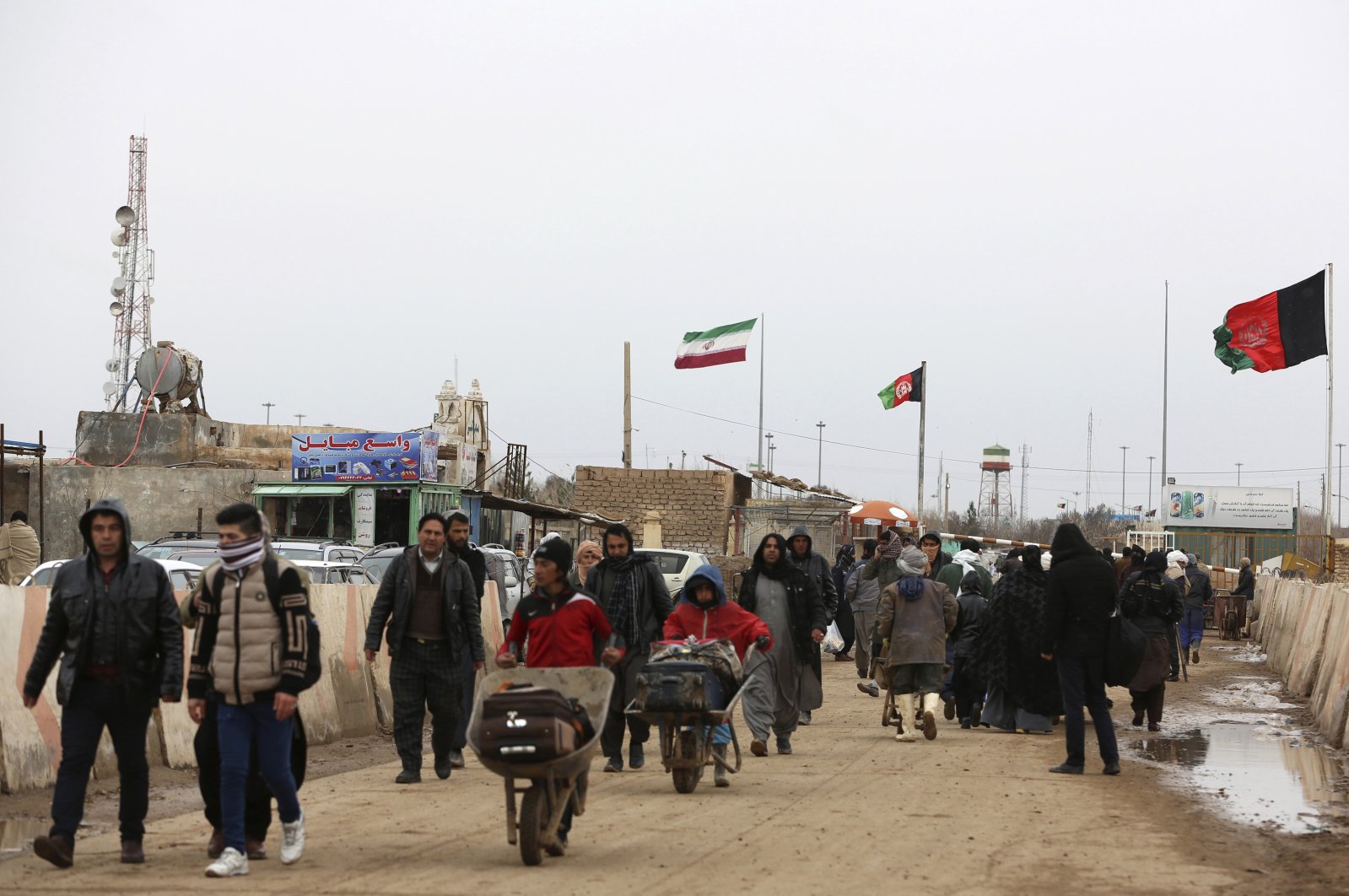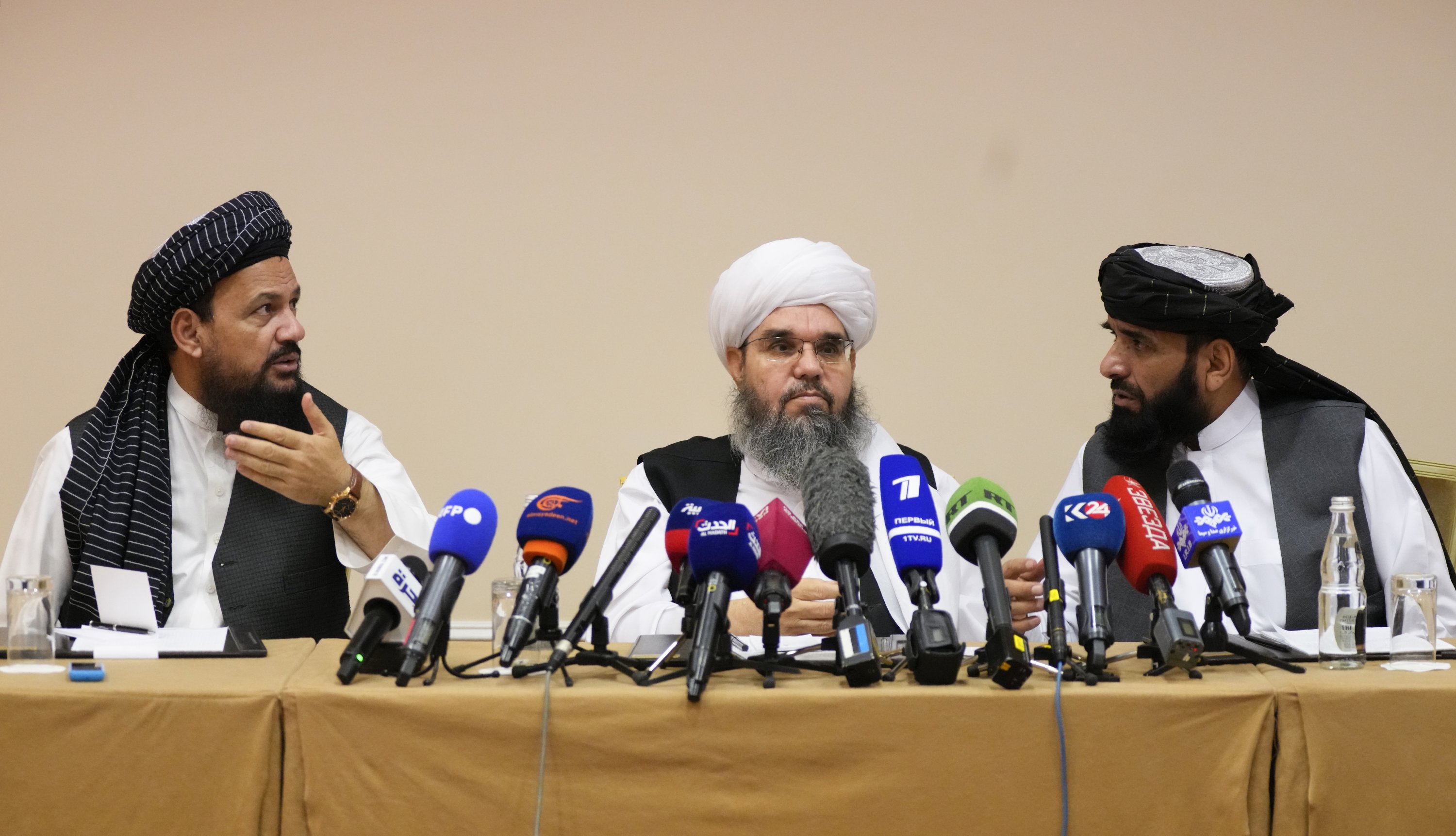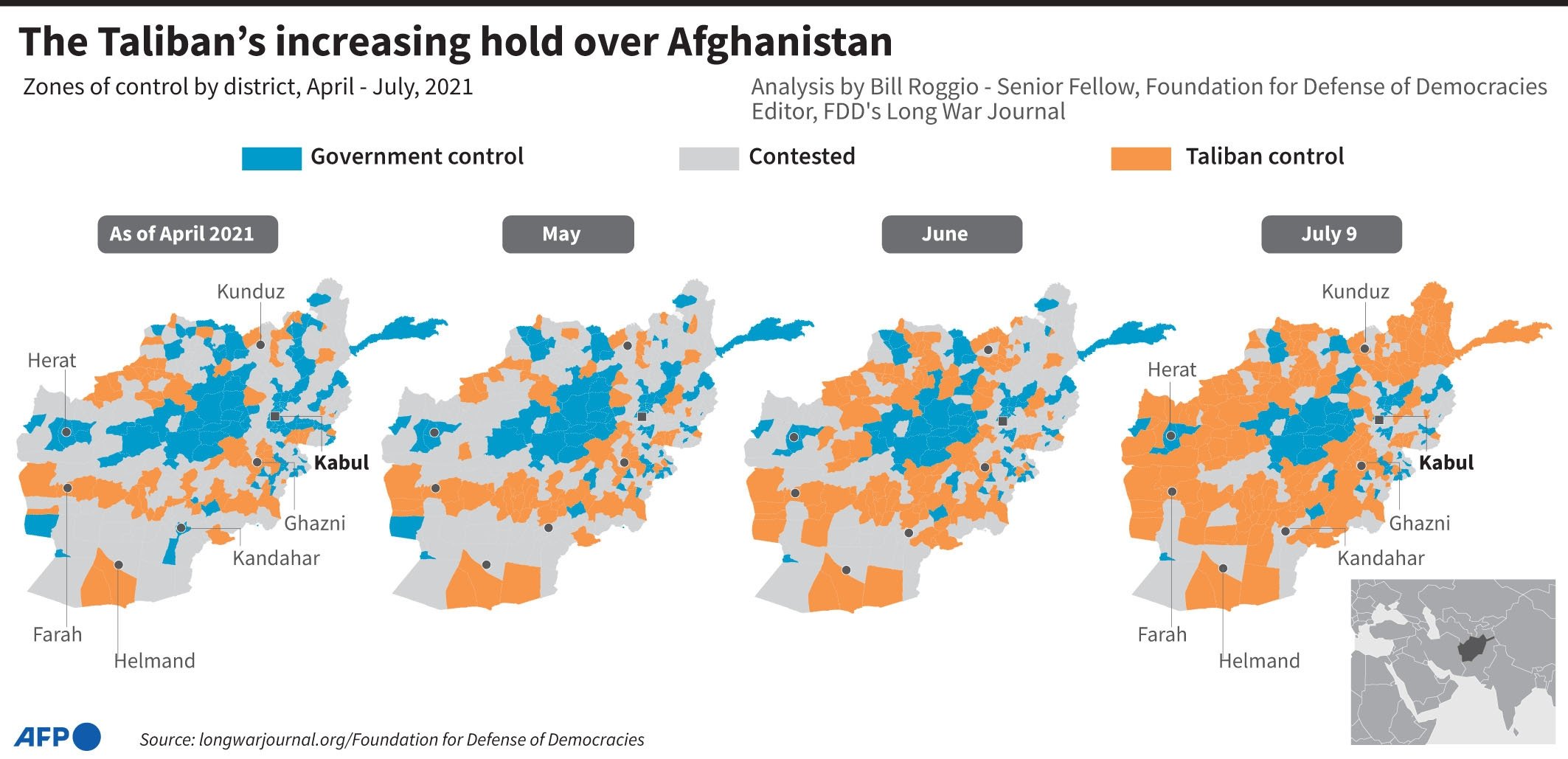Taliban seizes control of key Afghan border crossing with Iran
‘
Afghans return to Afghanistan at the Islam Qala border with Iran, in the western Herat province, Afghanistan, Feb. 20, 2019. (AP Photo)
Taliban takes full control of a key district in western Afghanistan, which includes an important border crossing point with Iran. The group continues to advance in the country, while NATO and foreign forces have nearly completed their withdrawal after their 20-year military presence
Taliban fighters have captured the key border crossing with Iran, hours after President Joe Biden issued a staunch defense of the United States military withdrawal from Afghanistan, as the armed group continues its rapid military advances around the country.
The Taliban has captured more than a third of the country’s districts since the U.S. accelerated its final pullout in early May. The insurgents now hold an arc of territory from the Iranian border to the frontier with China. A government official said efforts were underway to recapture Islam Qala – the main conduit for trade between Afghanistan and Iran.
“All Afghan security forces including the border units are present in the area, and efforts are underway to recapture the site,” Afghan Interior Ministry spokesperson Tareq Arian told Agence France-Presse (AFP). Taliban spokesperson Zabihullah Mujahid said the crossing was “under our full control.”

Hours earlier, Biden said the U.S. military mission would end on August 31, having “achieved its goals.” But he also admitted that it was “highly unlikely” Kabul would be able to control the entire country.
“The status quo is not an option,” Biden said on the issue of the U.S. staying in the country. “I will not send another generation of Americans to war in Afghanistan.”
In the last week, the Taliban has overrun areas bordering five countries – Iran, Tajikistan, Turkmenistan, China and Pakistan – as foreign forces end their 20-year intervention and the domestic security situation deteriorates. Pitched battles between Taliban fighters and Afghan government forces were also underway in the northern Balkh province bordering Uzbekistan.
Two senior security officials told Reuters News Agency on condition of anonymity that the Islam Qala border crossing with Iran, located in Herat province, had fallen to the Taliban and that Afghan security and customs officials had fled across the border.
Al Alalam TV, Iran’s official Arabic language service, also reported that Afghan soldiers had entered Iranian territory via the border crossing to escape the Taliban. Tariq Arian, the spokesperson for the Afghan Interior Ministry, denied the reports and said the border crossing was still under the control of government forces.
Another security official said Taliban fighters had seized five districts in Herat without a fight. Earlier this week, more than 1,000 Afghan security personnel fled into Tajikistan as the Taliban captured most of the northern province of Badakhshan, which also borders China and Pakistan.
The Defense Ministry said Afghan government forces earlier on Thursday wrested back control of Qala-e-Naw, capital of the western province of Badghis, which the Taliban had stormed on Wednesday. Hundreds of troops were deployed to the region, the ministry said, adding that fighting continued on the fringes of Qala-e-Naw, where the Taliban had earlier seized key government buildings in the city, including police headquarters.
“The city is fully (back) under our control, and we are conducting operations against the Taliban on the outskirts of the city,” Defense Ministry spokesperson Fawad Aman said
The ministry said 69 Taliban fighters were killed in operations on the edge of Qala-e-Naw – the first major provincial capital entered by the fighters in their latest offensive.
The Taliban says it holds more than 200 districts in 34 provinces comprising over half the country. The Taliban official Shahabuddin Delawar asserted in Moscow Friday that the group controls 85% of the territory in the country. At a press conference in Moscow, Taliban negotiator Shahabuddin Delawar said that “85% of Afghanistan’s territory” is under the group’s control, including some 250 of the country’s 398 districts.
According to Russia’s Foreign Ministry, the Taliban currently controls more than two-thirds of the border between Afghanistan and Tajikistan, the Interfax News Agency reported Friday. The ministry called on all sides of the Afghanistan conflict to show restraint and said that Russia and the Moscow-led CSTO military bloc would act decisively to prevent aggression and provocations on the border, RIA News reported.
“We have noted a sharp rise in tension on the Afghan-Tajik border. The Taliban movement quickly occupied a large part of border districts and currently controls about two-thirds of the border,” Russian Foreign Ministry spokesperson Maria Zakharova said. She added that Moscow is ready to take “additional measures” to “prevent aggression” on its ally Tajikistan and called on all sides to “avoid spreading tensions outside of the country.”
After the Taliban routed much of northern Afghanistan in recent weeks, the government held little more than a constellation of provincial capitals that must be largely reinforced and resupplied by air. Afghanistan’s air force was already under severe strain before the Taliban’s lightning offensive overwhelmed the government’s northern and western positions, which will likely put further pressure on the country’s limited aircraft and pilots.
Biden said the U.S. “did not go to Afghanistan to nation-build” and that the Afghan people alone should determine their future. But he acknowledged the uncertainty about what that future would look like. Asked if a Taliban takeover was “inevitable,” the president said, “No, it is not.” But, he admitted, “the likelihood there is going to be one unified government in Afghanistan controlling the whole country is highly unlikely.”
The Taliban, for their part, welcomed Biden’s statement. “Any day or hour that U.S. and foreign troops leave earlier is a positive step,” spokesperson Suhail Shaheen told AFP.
After thousands of people fled Qala-i-Naw, Afghan President Ashraf Ghani said the government could handle the situation, but admitted difficulties lay ahead. “What we are witnessing is one of the most complicated stages of the transition,” he said in a speech in Kabul. “Legitimacy is ours; God is with us,” he said.
The troop withdrawal has emboldened the Taliban, and with peace talks with the government deadlocked, appear to be pressing for a full military victory. Still, on Thursday, a member of the negotiating team in Doha insisted the insurgents were seeking a “negotiated settlement.” “We do not believe in monopoly of power,” Shaheen said.
Stop-start peace talks between the government and the group remain inconclusive. Taliban delegations visited Iran Wednesday and were in Moscow Thursday.
The Taliban is free to attack administrative centers in Afghanistan as it made no promise to the U.S. to leave them alone, a Taliban official said in Moscow. But the official said the insurgents would not take provincial capitals by force. RIA News reported Friday that the Taliban delegation and officials in Moscow discussed a possible cease-fire deal with Kabul. Meanwhile, Interfax reported that it is ready to halt the offensive, but only if the negotiations in Doha are successful.

According to the Russian Foreign Ministry, the Kremlin envoy for Afghanistan, Zamir Kabulov, met with the Taliban delegation to express concern about the escalation and tensions in northern Afghanistan. The ministry said Kabulov urged the Taliban “to prevent them from spreading beyond the country’s borders.”
“We received assurances from the Taliban that they wouldn’t violate the borders of Central Asian countries and also their guarantees of security for foreign diplomatic and consular missions in Afghanistan,” the ministry said.
Russian officials have expressed concern that the Taliban surge could destabilize the ex-Soviet Central Asian nations north of Afghanistan. In comments carried by the Russian News Agency TASS, Taliban spokesperson Mohammad Sohail Shaheen said their delegation came to Moscow to “assure that we won’t allow anyone to use the Afghan territory to attack Russia or neighboring countries.”
“We have very good relations with Russia,” he was quoted by TASS as saying, adding that the insurgents remain committed to a peaceful political settlement in Afghanistan.
Moscow, which fought a 10-year war in Afghanistan that ended with Soviet troops withdrawing in 1989, has made a diplomatic comeback as a mediator, reaching out to feuding Afghan factions as it has jockeyed with the U.S. for influence in the country. It has hosted several rounds of talks on Afghanistan, most recently in March, that involved the Taliban – even though Russia has labeled them a terrorist organization. Russia this week expressed readiness to support Central Asian nations that are part of the Moscow-dominated Collective Security Treaty Organization (CSTO).
“We will do everything, including using the capacity of the Russian military base on Tajikistan’s border with Afghanistan, in order to prevent any aggressive moves against our allies,” Russian Foreign Minister Sergey Lavrov warned Wednesday.
Source:dailysabah.com
